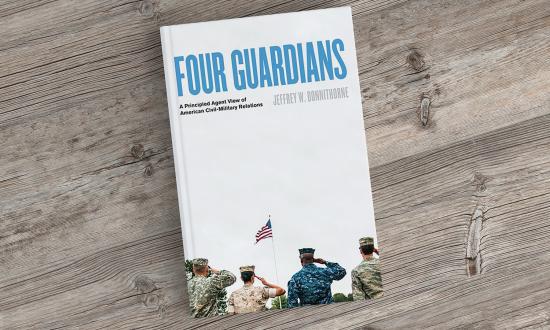Honor Bound: An American Story of Dreams and Service
Amy McGrath. New York: Knopf Publishers, 2021. 272 pp. $28.
Reviewed by Shannon Huffman Polson
I first talked to Amy McGrath just before she announced her congressional campaign, one of a series of interviews of leaders in the vanguards of their fields making up the backbone of my book, The Grit Factor (Harvard Business Review Press, 2020). I appreciated her directness and her candor, both qualities that are present throughout her memoir, Honor Bound, which looks back on her stellar career of service as a Marine Corps fighter pilot up through her well-publicized congressional campaign. Her focus remains professional, though she takes readers through the stuff of life as well: a solid family foundation, her marriage, her father’s death, and the birth of her first child.
Honor Bound portrays a young woman of exceptional determination coming to maturity just after the lifting of the aviation combat exclusion. At the U.S. Naval Academy, Midshipman McGrath is laser-focused on an assignment in aviation with the Marine Corps option. Successes surround her erstwhile failure in land navigation at The Basic School, and she concludes thoughtfully that she does not trust a Marine who has not failed.
The narrative of Honor Bound follows McGrath’s exceptional career as an F/A-18 backseater, with three combat deployments, two in Afghanistan and one in Iraq. She is one of the first Marine women to fly the F/A-18 in combat, returns to qualify as a frontseater, and is the first woman to graduate from Air Combat Tactics Instructor training and the Marine Division Tactics Course in air-to-air combat. McGrath describes landing on a carrier and the rigor of Survival, Evasion, Resistance, and Escape (SERE) school. She serves as a congressional fellow and then in a role at the Pentagon.
McGrath in no way shies away from the cost of duty. After her deployment to Iraq, she notes that “a crisis of conscience is something that plagues all warriors in combat.” This reckoning is further complicated by her Catholic faith. Attending mass on deployment, she writes, “I sat there hoping I could remain attached to the person I was before the war.”
Duty is her touchstone, yet McGrath’s relationship to her work becomes more complex with seniority and experience in both the tactical requirements of the job and frustration with the policies leading to those requirements. Initially reassured by Colin Powell’s endorsement of the war in Iraq, she is later disillusioned: “I had no idea if it was an intentional mistruth or simply misrepresenting incomplete intelligence, but it was a bitter pill to swallow.”
Though she is aware of the gender discrepancies and cultural impediments, conspicuously absent is any address of the continuing epidemic of sexual assault, harassment, and rape in the military. In the wake of the 1991 Tailhook scandal, which occurred while she was attending the Naval Academy, McGrath’s response was to think “the only way the sexual assault stuff and demeaning crap will stop is if women are doing the exact same jobs as these guys and doing their duty well.” This partial truth ignores a growing reality for many military women and men.
McGrath never approaches anything like true interiority; at the end of Honor Bound, we know her exceptional performance, but of her question of who she was before or after combat, we neither know her own assessment nor are we equipped to make our own. Her writing demonstrates what women who serve know well: There is no reward for vulnerability. At the same time, McGrath’s memoir leaves no doubt that the nation and the Marine Corps are better for her service and that the opportunity to serve with honor in any capacity should be open to all.
Ms. Polson served as one of the first women to fly the Apache helicopter in the U.S. Army. She earned her MBA at the Tuck School of Business at Dartmouth, is the founder of the Grit Institute, and speaks frequently on topics related to leadership, courage, resilience, and grit. She is the author of The Grit Factor: Courage, Resilience, and Leadership in the Most Male-Dominated Organization in the World (Harvard Business Review Press, 2020).
By Water Beneath the Walls: The Rise of the Navy SEALs
Benjamin H. Milligan. New York: Bantam, 2021. 640 pp. Notes. Illus. Index. $28.
Reviewed by Captain Paul Shemella, U.S. Navy (Retired)
From its intriguing title to a lengthy list of source notes, By Water Beneath the Walls is a remarkable book. Ben Milligan, a former SEAL officer, has written the definitive history of Naval Special Warfare. It is, however, much more than that. Milligan devoted seven years of original research to one fundamental question: How did the Navy, the most unlikely of the services, end up dominating commando operations beyond the beach? The answer, readers discover, is anything but simple.
The book is a thrilling saga of individual heroism and institutional blundering through World War II, the Korean War, and Vietnam. Milligan, in a style reminiscent of military historian and author of the Pacific War Trilogy Ian Toll, commands an obscure history to come alive. This is a seminal work that will anchor academic studies while never failing to entertain the general reader. Writers of fiction could not dream up a series of plot lines to match what actually happened.
This is a long book that does not feel long. Milligan tells an epic story in five parts: Neglect, Opportunity, Relevance, Exigency, and Culmination, with a conclusion titled “Nature Abhors a Vacuum.” Each part is organized into chapters that bundle the initiatives of competing organizations together in a 30-year struggle to create small units capable of punching far above their weight. The author is decidedly even-handed in critiquing the tactical experiments of all the U.S. military services. Spearheaded by incredibly brave raiders and rangers—largely by trial and error—strategic effects indeed were created, but not, it appears, fully appreciated. Time and again, these specialized forces were quickly dismantled by flag officers more interested in winning their wars by conventional means. Milligan’s story reveals how imagination, courage, and tactical innovation can transform (or circumvent) doctrinaire and traditional thinking. It is a full-semester graduate course waiting to happen.
So, how did SEAL units become the force of choice for land-based commando operations in Iraq and Afghanistan? How did they get the green light to go after Osama bin Laden in Pakistan? By Milligan’s account, the die was cast in Japanese-occupied China, where the U.S. Navy waged guerrilla warfare while rival institutions hesitated. In Europe and the Pacific, newly created naval forces conducted near-shore reconnaissance and blasted open the way for amphibious assaults. In Korea, frogmen came ashore to sabotage railroad tracks, bridges, and tunnels. What is now called “fear of missing out” motivated junior-level SEALs to go looking for a mission in Vietnam. They found it in the swamps of the Mekong Delta, snatching key figures, interrogating them, and immediately using that intelligence to snatch others. SEAL units carried this operational DNA with them all the way to Afghanistan.
Naval Special Warfare as we know it was a long time coming. Extraordinary junior officers and petty officers emerged at every critical juncture to conduct daring operations that made a strategic difference. Their pathfinding efforts were valued and nurtured along the way by enlightened naval leaders from Phil Bucklew and Draper Kauffman to Arleigh Burke and Elmo Zumwalt. Milligan profiles key figures at both ends of the chain so masterfully that readers will come to regard them as mentors and teammates.
Shaped by more than two centuries of operations on the high seas, the Navy has always been the most independent and strategic-oriented service. With this in mind, the evolution of SEALs might seem to have been inevitable. It was not. By Water Beneath the Walls tells the riveting story of how it all happened and why.
Captain Shemella is a retired Navy SEAL officer, a novelist, and a lecturer emeritus at the Naval Postgraduate School.
Challenges: Leadership in Two Wars, Washington DC, and Industry
Major General Harry W. Jenkins, U.S. Marine Corps (Retired). New York: Fortis, 2020. 371 pp. $16.95.
Reviewed by Dustin League
Retired Marine Corps Major General Harry Jenkins takes a moment early in Challenges to explain why he has, with much encouragement from family and colleagues, undertaken the task of writing his memoirs: “There are several experiences in this book that provide both historical and human examples of what can be accomplished [emphasis added] for those who are coming behind and facing the challenges of the future.” This sort of mission statement is useful in reviewing memoirs, as their quality can be quite subjective depending on how interesting a particular reader finds an author’s life. Judged against his own standard, however, Jenkins succeeds. He tells the story well, with clear prose and thoroughness, but in a rather linear way. The judicious use of hindsight and foresight to show how the challenges he faced changed the way he thought or acted would have been helpful to young service members looking to emulate his success.
Challenges begins with a brief sketch of Jenkins’ life before the Marine Corps, growing up in California and exploring the outdoors and skiing. Within the first six pages he has joined the Corps, and it is this career that takes up the bulk of the book. Sections on Officer Candidate School and tours in Vietnam as a young officer are vivid and engaging, depicting rough conditions honestly, with neither glamorization nor gratuity. Various post-Vietnam positions of increasing rank and responsibility follow, and Jenkins, while never complaining about any of his posts, does not hide which ones he found more interesting than others.
Perhaps the highlight of the book comes late in his Marine Corps career, when he takes command of the 4th Marine Expeditionary Brigade during Operation Desert Storm. Here, the scope expands dramatically compared to the Vietnam sections, and Jenkins, now a seasoned general, discusses not only his own personal role and actions, but also the operational and strategic aspects of his command and the past, present, and future of amphibious warfare. Challenges does not end with Jenkins’ retirement from the Marine Corps, and he takes readers through the culture shocks and mind-set shifts needed to operate as a civilian defense contractor.
Each of these sections is well told, but they often feel compartmentalized to the point it is sometimes frustrating. Readers going into the book know that the young lieutenant in Vietnam will someday become a two-star general, but the broader view that a general could take of that war is absent entirely. Several times, as Lieutenant Jenkins was leading his men on various missions, I wanted to know what the general thought—would he agree with how those Marines were being employed? Had his view of the war changed? Likewise, I wondered what the lieutenant would think of the general as he commanded the 4th Marine Expeditionary Brigade; how had Jenkins’ experiences in the earlier war shaped his command philosophy or impacted his decisions during the later war? Not only would this have made each section feel more integrated into the book, but it also would have allowed the author to highlight more clearly and definitively lessons he wants his readers to take away. As it is, readers are left to connect the dots themselves or to view each chapter of the general’s career as largely isolated from those preceding.
Challenges is an engaging and detailed story of one man’s career of service to country. It is well written and covers a wide variety of life experience. I recommend it to anyone interested in the Marine Corps.
Mr. League is a military operations analyst and former Navy submarine officer. He studies submarine warfare issues for the U.S. and Australian navies.
Think Again: The Power of Knowing What You Don’t Know
Adam Grant. New York: Viking Books, 2021. 320 pp. Notes. Illus. Index. $28.
Reviewed by Lieutenant Colonel Dillon Fishman, U.S. Marine Corps Reserve
Familiar customs and traditions permeate military life. But when the familiar becomes sacrosanct, facts may be sacrificed on the altar of habits, assumptions, and instincts. Such an approach becomes particularly risky when knowledge is increasing at an exponential rate, as is now the case.
In Think Again, renowned University of Pennsylvania Wharton Business School Professor Adam Grant argues that in today’s rapidly changing world, people need to spend as much time rethinking as they do thinking. Outdated facts, Grant contends, are like mental fossils that are best abandoned. The book’s three parts present an inside-out approach to intellectual improvement.
Part I, “Individual Rethinking,” sets the foundation by advocating for mental flexibility, which Grant describes as both a skill and a mind-set. Grant characterizes the default mental modes as those of prosecutor, preacher, and politician. Prosecutors zealously argue for their position, preachers sermonize to teach their sacred beliefs, and politicians campaign for approval. All three approaches, which are common, reflect an ideological attachment to particular ideas and outcomes, leaving one vulnerable to confirmation and desirability biases.
Conversely, Grant advocates for the scientific method, which requires running experiments to test hypotheses in search of truth. Scientific thinking requires one to maintain curiosity, entertain doubt, and examine alternative explanations rather than relying on assumptions. For example, rather than doggedly defending our views, like scientists we can develop the habit of forming our own second opinions. We can even search for reasons why we might be wrong, which will help us detach our ideas from our identity. Likewise, a “good fight club” leads to improved teamwork because high-performing groups have productive disagreement focused on ideas.
Part II, “Interpersonal Rethinking,” shows how to debate better, destabilize stereotypes, and improve listening. For instance, research shows that the best debaters find common ground and ask questions, rather than going on the attack and then getting defensive. Grant also discusses disrupting stereotypes using experimental research on die-hard Red Sox and Yankee fans that showed how the power of thinking about the arbitrariness of one’s animosity can shift views toward other groups.
Part III, “Collective Rethinking,” addresses depolarizing discussions, questioning accepted knowledge, and building learning cultures. To depolarize, Grant proposes “complexifying,” or showing a range of perspectives on a topic to illustrate the futility of dividing issues into two extremes. Grant challenges readers to ask themselves, and each other, a critical question: How do you know?
Grant has repeatedly been voted Wharton’s most popular professor for a reason: His writing is rigorous, practical, and entertaining. Although the book is an easy read, Grant amasses more than 450 endnotes to buttress his claims. He cites research such as that which gave rise to the Dunning-Kruger effect: People who score lowest on tests of logical reasoning, grammar, and sense of humor have the most outsized opinions of their own abilities. Thus, competence and confidence should not be conflated.
Grant’s timely book invites intellectual agility, cognitive flexibility, and doubt. He urges us to start by recognizing how often we are wrong. The book’s implications for the military are many. In the area of talent management, for example, leaders may question the longstanding dogma favoring three-year tours of duty and frequent moves. Similarly, Grant’s approach might lead one to examine the necessity for the 20-year retirement and perhaps even scrutinize the rationale for the existence of separate military services.
Think Again—a conceptual cousin of Daniel Kahneman’s Thinking, Fast and Slow (Farrar, Straus, and Giroux, 2013)—is an ode to epistemic humility. It should be required reading for military leaders at all levels, particularly senior leaders in positions to influence policy.
Lieutenant Colonel Fishman, a Marine Corps judge advocate, is completing a PhD in leadership studies. He deployed twice to Afghanistan and once on board the USS Tortuga (LSD-46).









